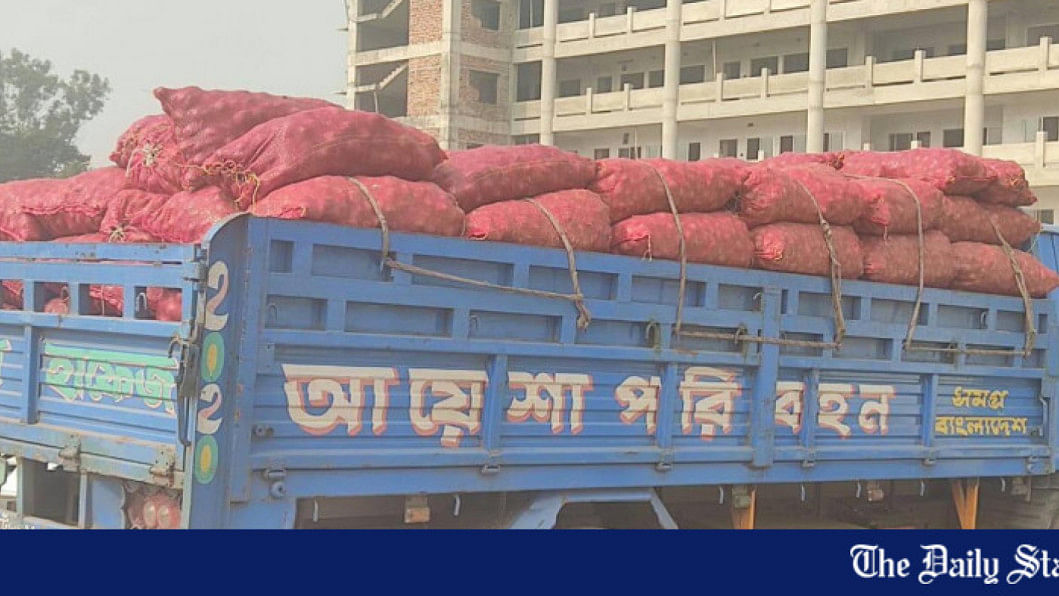How the cheap turns costly

Commodity prices bear volatile characteristics that have no particular feature. They can change several times in a day and pass through some steps to get their final shape.
Growers prefer to farm commodities in rural areas to make best use of soil fertility. The price circle starts here and gets rolling. The green vegetables, or commodities, are sold at cheap rates from the growers' field. But this price triples or sometimes quadruples, for which, any single factor is not responsible.
Transportation
A wholesaler pays in two phases to transport the goods: inside the market and outside the market.
Mojibur Rahman, manager of Chowdhury Banijjyalaya in Kawran Bazar, said he spent around Tk 3 to Tk 3.5 in transportation costs to bring a kilogram of pointed gourd to the kitchen market from the grower's garden in Jhinaidah.
"We also have to pay to carry the products to our shop inside the market," he added. Rahman pays around Tk 30 to a labourer to load and unload a 6-maund sack of pointed gourd, while it can go up to Tk 80 in case of a 20-maund sack.
Waste
Kitchen market products are more sensitive than other daily essentials. A delay in sales or the excessive use of water can spoil the items.
Sellers lose around 10 percent of commodities before preparing the produce for sales.
"Sellers sprinkle water to give vegetables a fresh look. But that actually is not good for us, as it's not possible to sell our total buy in a day," said Md Malek, a retail vegetable shop owner at the Mohammadpur kitchen market.
"As a day progresses, the rate at which vegetables spoil goes up. We have to raise the price to minimise losses."
Storage charges and Koyeli
Storehouse owners charge different rates to hoard goods. Mojibur Rahman of Karwan Bazar takes Tk 3-3.5 a night to store every 5 kilogram of snake beans from wholesalers as trucks laden with such commodities appear at night.
Industry insiders call a storehouse owner an 'Aratdar' and the rate, 'Aratdari'. The rate to store a 20-maund pack of pointed gourd is Tk 300.
This sector bears another kind of commission -- Koyeli.
At most times, a steady rate is maintained and it goes into the aratdar's pockets. Retailers pay in this case. Koyeli for every 5 kilogram of papaya, brinjal and ridge gourd stands at around Tk 3 in almost all markets in Dhaka. Rice has the lowest commission, Tk 0.30 a kilogram.
Barek Mollah, a fruit retailer at Mirpur 1, said he paid the commission at a rate of 10 percent, which is also the same for some vegetables like cabbage, cauliflower and sweet pumpkin.
Only a few commodities, like potato, onion, garlic and ginger, enjoy Koyeli-free business.
In addition, prices go up because wholesalers have to pay the illegal tolls and guards to bring the produce to Dhaka. Sometimes, buyers have to wait with their goods at the point of purchase due to a lack of means of transportation, a non-favourable weather condition or any other problem.
In this case, buyers deploy a guard with payment to take care of the essentials. This is almost equivalent to the transportation cost.
In addition, there are illegal tolls that make the kitchen market goods more pungent. These two are not common always but can be substantial.
Import is another option but goods need to be brought from further away and there is the risk of greater waste and higher expenses.
"The selling price of the commodities are fixed by adding all these expenditures with the amount buyers pay to the growers," said Monir Miya, a commodity importer in Shyambazar.
This is how a Tk 22-25 kilogram of vegetable is sold for Tk 80 in supermarkets, Miya added.
Prices go up another level when the goods reach the retailer's shop, as a retailer profits by around 30 percent.
"Too many hands are there. Everyone makes the highest possible profit. And we are only a part of the show," said Malek, the retailer in Mohammadpur. Kamal Sardar, a vegetable grower in Faridpur, depicts the truth.
"We cannot afford to buy our products after selling them once. They are like a rich son of a poor father."

 For all latest news, follow The Daily Star's Google News channel.
For all latest news, follow The Daily Star's Google News channel. 



Comments